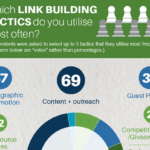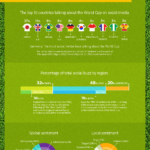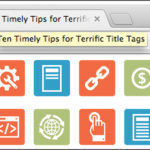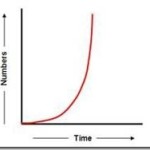Google just gets smarter as time passes. It seems to have developed a keen sense of judgment where it cuts, jettisons, and trashes any content that doesn’t add value, spams the system, or tries to “play to win”.
Google wants webmasters to acquire natural links, gain authority by trading value, and to publish content that resonates with readers. Link building is crucial for SEO and that’s probably the reason why you are reading this. How you go about acquiring backlinks is another story.
Here are some tips to develop the right link building strategy:
Produce more valuable content. Period.
No magazine publishes an article that can maim its reputation. Magazines don’t publish any article that is of low quality, irrelevant, and that which is full of mistakes, clichés, and errors. Professional writers produce every feature article with emphasis on real interviews, research, and proper attribution. Where’s that kind of quality control with bloggers, company blogs, online publications, and websites?
Business owners aren’t writers. Bloggers can blog but they still aren’t writers. Still, writing is an acquired art. If you can write, do so. If you cannot or if you’d rather do something else, hire professionals to do it for you. Hiring professional writers isn’t a cheap affair because they aren’t available for $5-$10 per post or article. They are, but they aren’t worth the spending. No self-respecting, hardworking writer works for those wages.
Stop looking for them. Don’t create content for the sake of it. Further, it’s not just about articles and posts. Web content developers can also develop other kinds of content such as slide decks, reports, whitepapers, research reports, eBooks, infographics and much more. The more variety and volume of content you develop with a regular frequency– with a heavy emphasis on quality, of course – the more your content is going to be shared and linked to.
Start with a link audit
Chuck Price of Search Engine Watch has an entire blog post on auditing links, as he believes that a link audit is the first step before executing your digital marketing plan. Whether your goal is to recover from a business-killing penalty or if you’d like to start a new plan for your online web properties, link building is till a very crucial part of your online marketing strategy.
The first step for an audit is to gather relevant data. Thankfully Google provides Google Webmaster Tools (GWT) that you can sign up for. Simon Heseltine of Search Engine Watch gives a detailed overview of GWT and how to set it up.
Once logged in, the tool shows you links that point to your website. After analyzing the data, your goal is to remove links that don’t add value. Remove links from URLs that aren’t indexed by Google, links relating to spam trash such as porn, pills, online gambling, etc.; inbound links that have no PR, paid links, and links coming in from link networks. Apart from these, it’ll help to clean up site wide links (blog roll, footer, and sidebars).
Identify generic links and find alternatives for them. Cyrus Shepard, a paid associate of SEOmoz.org has a post dedicated to help you identify creative alternatives to generic links that you can use.
Directories: Just where are you showing up?
While the spate of ongoing Google releases to clean up the web is evident, it’s unclear as to how web directories took a hit. If it’s a low quality web directory, however, it doesn’t take too long to ascertain how it can affect your web property. A link pointing to your site from a low-quality web directory is almost always a low quality link which would hurt your website ranking more than it can stand to benefit it.
Set a limit to about 10 maximum links pointing to your site. Out of these 80% should be from high quality, reputed web directories such as DMOZ, Yahoo Directory, Best of the Web, and other parallel directories such as business.com. The remaining 20% could be from directories specific to your industry vertical or local directories that serve country specific listings of websites.
The key thing with web directory links is that it’s not a source for bulk links. In fact, if you can’t source quality links there isn’t much you are doing for your website as far as directory links go.
If it’s not a worthy guest post, don’t bother
After article directories took a massive hit post Google’s Penguin update in 2012, it was time for a new solution which happens to be guest posting. Most webmasters, bloggers, and businesses now depend on guest posting to get precious links (not to mention traffic, exposure and more credibility). Here are some simple rules for effective guest posting, in a nutshell:
- Guest posting is like getting a job or a new client.
- There’s the inevitable hustle, and there are rejections. Some of these rejections can even kill the buzz and derail your enthusiasm. Just keep at it.
- Guest posts fetch you valuable links only if your posts are of superb quality. The links should also originate from reputed, well-trafficked, and well-ranked blogs.
You can’t buy your way into guest post (and that’s not very different from buying paid links). Sourcing or developing content that doesn’t add value is another mistake most marketers do. Further, it’s not a one-time affair. If you have to do guest posting to build a healthy list of inbound links, you must keep at it for as long as you are online.
If link building is easy and scalable, it’s not right
Remember Build My Rank (BMR)? The service that allowed marketers to develop short 150 word posts with links in them? BMR writers were available for cheap, the content was easy enough to develop, and it almost looked like a great way to build (and scale up) links. Google banned it outright. If you can scale up backlinking, Google sees the patterns. It vehemently blocks all attempts to build links as if they are produced in a factory.
According to SEOmoz’s Whiteboard Friday on High-Value Tactics, Future-Proof Link building, High-quality links such as those acquired naturally, editorial links, and those from social media, commenting, and other forms of digital content are the desirable ones.
Surprisingly enough, the most desirable of the links you work hard to acquire are the ones you have no editorial control over. In that sense, you will not be able to dictate the actual anchor text found on these links. If you had to work, keep your acquired links in the natural zone. Let others find your content and link back to you the way they see fit.
How are you building your links? What’s your strategy?









Babanature
Hello Pratik,
This post is just so awesome and i love every lines of it. I Build my links through high PR site directory, Social media and also blog commenting. Thanks
Smith
Excellent post. You really dialed that in. It’s the simple principles that worked for people that have already been where we are heading and desire to be that we should pay close attention to.Thanks for keeping it real and I always look forward to your next post!
Daniel
Interesting post Pratik. I have my thoughts all about this new Google policy. I understand they want to give the most relevant results. But as per your suggestion I believe that just creating awesome content is not enough.
People should build links to get traffic from those links, and focus on that action only. Naturally if those visitors like the website they probably will like it on facebook or g+ it and even share it on their blogs. And you would probably get traffic from those links too. And if the viral work continues increasing your links in no time you could get thousands of referral traffic to your site per day.
And if Google is doing its job fine well they probably will help you with some traffic. IF not well you don’t have nothing to worry about because you will be getting traffic from your referrals as you increase your backlink count.
It’s just unnatural these link auctions and things. It goes against the nature of the web.
Seems like Google is constantly hitting something lately. You used to read about how you should be doing this or that. Now I hear a lot of don’t do this anymore. For some it was easier to cheat or resort to sneaky practices rather than play by the rules.
There is a lot of copied content and flat out junk out there. Sometimes I wonder if half of the sites out there or content pages just got deleted from the web if we would even notice.
George
You have successfully detailed the only link building strategy that will work in the future as well, imho. The only thing I’d do differently is go for a larger number of high value, niche related directory links. I am sure that Google would appreciate any link that comes from the “resources” page of a reputable .edu site.
Jaimie
Good post… but I disagree with a lot of your backlink penalties.
According to Google, links cant penalize the sites they are linking to. With the logic in this post, I should build a word press theme and put sneaky backlinks with exact anchor text all pointing to my competitors. And then go buy links for $19 pointing to them too (that’s a pretty cheap way to damage your competitors rankings). Sorry, those type of links only damage the sites that they are on… Not what they are pointing to. Otherwise, it would be chaos.
You could say that intitially those backlinks boosted you’re rankings, then Google figured it all out and stopped giving those links any value, thus could cause your rankings to drop. But that’s not a penalty. It was just artificial rankings.
Milan
I can’t agree with you Jamie…
“those type of links only damage the sites that they are on… Not what they are pointing to”
Sorry, but this is not a true. You have many examples over the web.
Really interesting Article pratik , I can learn some thing in your blog… Now i know Link building is how much important for website promotion.. Thanks for such a wonderful article..
Mark
After using a blog network, SEONitro, and got penalized by Google for it, I was a bit of disappointed and lost hope on building links for my sites especially the niche sites.
Currently, I am not building backlinks that hard compared before. Rather, I focused writing contents for my blogs and sites.
Bryan Clark
Hit the nail on the head with this one. There are no shortcuts to “good” SEO. It’s all about persistence and good content.
Hi Bryan.. Read your article and I left my two cents over there. Would love your thoughts about it 🙂
Hey Pratik, at this point with the internet swarming with blogs of all niche, you have to be very careful about what you are putting on your blog. In this stiff competition, a single mistake can turn out to be very dangerous. Be it a guest post or an article written by you, it should be very carefully examined.
Zion
Google is definitely upping its game. I believe this is a great move for them. There focusing more of their efforts on quality content. Not only will this encourage bloggers to continuously provide great content but also discourage spammers! wohoo!
I would agree that Guest posting is one of the most reliable sources of builing quality links but yes you are right that the content has to be superb otherwise you will create bad impressions on the bloggers for whom you guest post as well as the readers who read these posts.
normally i never think much about link building. I’m just happy reading and leave comment at the blog or website that i love to visit regularly
Binh Le
While I agree with most that you say above (and on other posts) I wish these rants would be followed with actual solutions on how to do things correctly.
Charlie
Interesting post Pratik.
I agree – content is KING. period.
I have not been accepted yet to guest post, but I definitely see the value in it and that is why I continually pursue this avenue of seo building. It does get you down though when you are continually rejected. I know I just have to keep improving my content though.
Spook SEO
Search engines are certainly upping its online game. In my opinion this can be an excellent proceed on their behalf. Presently there concentrating much more of the initiatives upon high quality content material. Not just may this particular motivate writer in order to constantly supply excellent content material but additionally dissuade spammers